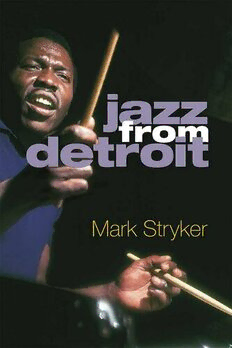
Jazz From Detroit PDF
Preview Jazz From Detroit
Revised Pages jazz from detroit Revised Pages Revised Pages jazz from detroit Mark Stryker University of Michigan Press Ann Arbor Revised Pages Copyright © 2019 by Mark Stryker All rights reserved This book may not be reproduced, in whole or in part, including illustrations, in any form (beyond that copying permitted by Sections 107 and 108 of the U.S. Copyright Law and except by reviewers for the public press), without written permission from the publisher. Published in the United States of America by the University of Michigan Press Manufactured in the United States of America Printed on acid- free paper First published July 2019 2 A CIP catalog record for this book is available from the British Library. Library of Congress Cataloging- in- Publication Data Names: Stryker, Mark, author. Title: Jazz from Detroit / Mark Stryker. Description: Ann Arbor : University of Michigan Press, [2019] | Includes index. | Identifiers: lccn 2019001977 (print) | lccn 2019002614 (ebook) | isbn 9780472125913 (E- book) | isbn 9780472074266 (hardcover : alk. paper) Subjects: LCSH: Jazz— Michigan— Detroit— History and criticism. | Jazz musicians— Michigan— Detroit. Classification: LCC ml3508.8.d4 (ebook) | LCC ml3508.8.d4 s87 2019 (print) | DDC 781.6509774/34— dc23 LC record available at https://lccn.loc.gov/2019001977 Cover photo: Elvin Jones from McCoy Tyner’s The Real McCoy session for Blue Note on Apr. 21, 1967, at Van Gelder Studio, Englewood Cliffs, N.J. Photo by Francis Wolff © Mosaic Images LLC. Revised Pages For Candace Revised Pages Revised Pages CONTENTS Preface ix A Note on Sources and Recordings xv Part one: Setting the Stage Jazz in Detroit, 1900– 1950 3 Part two: The Golden Age, 1940– 60 Opening Chorus 11 Gerald Wilson: Head and Heart 17 Yusef Lateef: Gentle Giant 26 Milt Jackson: Bags’ Groove 35 Sheila Jordan: Sheila’s Blues 44 Barry Harris: Professor of Bebop 53 Tommy Flanagan: A Legendary Touch 63 Kenny Burrell: Community Builder 72 Donald Byrd: Renaissance Man 81 Roland Hanna: Magician 90 Curtis Fuller: Trombone on Top 100 Louis Hayes: The (Cymbal) Beat Goes On 109 Ron Carter: The Right Note at the Right Time 118 Joe Henderson: The Phantom 127 Charles McPherson: Reminiscing by Ear 136 Part three: The Jones Brothers Opening Chorus 147 Hank Jones: One Extra Ace 150 Thad Jones: Jonesisms 158 Elvin Jones: Philosopher King 167 Revised Pages Part four: Taking Control— Self- Determination in the 1960s and ’70s Opening Chorus 177 Detroit Artists Workshop, Detroit Creative Musicians Association, and Focus Novii 181 Contemporary Jazz Quintet and Strata Corporation 188 Tribe 197 Coda 203 Part five: Marcus Belgrave and His Children Marcus Belgrave: The Nurturer 207 Geri Allen: Back to the Future 217 Kenny Garrett: Sound and Spirit 226 Regina Carter: Searching for Roots 234 Gerald Cleaver: The Big Picture 242 Robert Hurst: Platonic Ideal 249 Rodney Whitaker: Family Man 256 James Carter: Volcano 264 Karriem Riggins: Dual Identity 272 Part six: Tradition and Transition in the 21st Century Opening Chorus 281 Present and Future: Ralphe Armstrong, Marion Hayden, Michael Malis, Marcus Elliot 282 Coda 293 Appendix A: Jazz Musicians from Detroit 295 Appendix B: List of Interviews 303 Acknowledgments 307 Index 309 Revised Pages PREFACE Whenever the Detroit- born pianist and composer Kenn Cox performed in clubs late in his life, audience members got not only a hefty dose of his impassioned musicianship but often an impromptu lecture, too. Cox, who died in 2008 at age 68, was a soft- spoken, sensitive man who clung stub- bornly to his artistic ideals. He liked to ruminate between songs about his heroes or comment on the vagaries of the jazz life. Cox had earned his soapbox. He spent nearly all of his professional life in Detroit, where he cofounded the pioneering musicians cooperative Strata Corporation in the late ’60s and played a leading role in the progressive Contemporary Jazz Quintet that recorded for Blue Note. Later he became a role model, men- tor, and truth- teller for younger musicians and audiences. Like all Detroit- bred jazz musicians, Cox was a proud champion of the contributions his hometown made to the music. One night in 2005, Cox led his trio through a vigorous set at Baker’s Keyboard Lounge, a historic club on Detroit’s north side that first started presenting jazz in 1934. Cox took the microphone at one point and began to wax poetically about fellow pianists produced by Detroit. He ticked off names like an honor role: Hank Jones, Willie Anderson, Tommy Flanagan, Barry Harris, Roland Hanna, Hugh Lawson, Terry Pollard, Kirk Lightsey, Harold McKinney, Johnny O’Neal, and Geri Allen. Cox then segued into a broader discussion about Detroit’s impact on modern jazz. He lamented that while the public knew about Motown and the city’s pop music legacy, Detroit’s contributions to jazz were still a secret to many. He mentioned some of the other leading figures from the city—v ibraphonist Milt Jackson, guitarist Kenny Burrell, trumpeter Donald Byrd, tenor sax- ophonists Yusef Lateef and Joe Henderson, baritone saxophonist Pepper Adams, bassists Paul Chambers and Ron Carter, trombonists Curtis Fuller and Frank Rosolino, and Hank Jones’ younger brothers, Elvin (a drummer)
